| Srl | Item |
| 1 |
ID:
001944
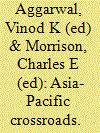

|
|
|
|
|
| Publication |
New York, St. Martin's press, 1998.
|
| Description |
xiv, 434p.
|
| Standard Number |
0312211104
|
|
|
|
|
|
|
|
|
|
|
|
Copies: C:1/I:0,R:0,Q:0
Circulation
| Accession# | Call# | Current Location | Status | Policy | Location |
| 043100 | 337.15/AGG 043100 | Main | On Shelf | General | |
|
|
|
|
| 2 |
ID:
104381
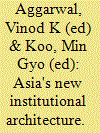

|
|
|
|
|
| Publication |
Berlin, Springer, 2008.
|
| Description |
vii, 321p.
|
| Series |
Political economy of the Asia Pacific
|
| Standard Number |
9783540748878
|
|
|
|
|
|
|
|
|
|
|
|
Copies: C:1/I:0,R:0,Q:0
Circulation
| Accession# | Call# | Current Location | Status | Policy | Location |
| 055976 | 352.01095/AGG 055976 | Main | On Shelf | General | |
|
|
|
|
| 3 |
ID:
064685
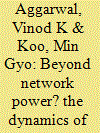

|
|
|
| 4 |
ID:
173189
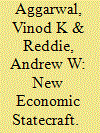

|
|
|
|
|
| Summary/Abstract |
The 2018 U.S. National Defense Strategy notes that the United States faces “an increasingly complex global security environment, characterized by overt challenges to the free and open international order and the re-emergence of long-term, strategic competition between nations.” In the ensuing months, much has been made of the security-related aspects of this return to great power competition — including Donald Trump’s role in the decline of the existing arms control architecture, responses to Russia’s annexation of Ukraine, and China’s use of subconventional — or “gray zone” — military operations in the South China Sea. What this analysis tends to miss, however, are the economic dimensions of strategic competition. To address the question of how insights from international political economy and security studies can be usefully combined to examine strategic competition, we examine how economic statecraft increasingly takes the form of economic policy beyond sanctions regimes. We argue that economic statecraft has become an increasingly central aspect of geostrategic consideration and consider how economic statecraft is being transformed in the current era.
|
|
|
|
|
|
|
|
|
|
|
|
|
|
|
|
| 5 |
ID:
149053
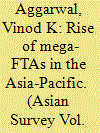

|
|
|
|
|
| Summary/Abstract |
This special issue focuses on the rise of mega-FTAs—which involve efforts to liberalize trade across geographical regions with a multiplicity of countries—in the Asia-Pacific. We examine how the Trans-Pacific Partnership and the Regional Comprehensive Economic Partnership in this region have faced political resistance as negotiators attempt to address behind-the-border issues.
|
|
|
|
|
|
|
|
|
|
|
|
|
|
|
|
| 6 |
ID:
120719
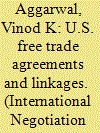

|
|
|
|
|
| Publication |
2013.
|
| Summary/Abstract |
Abstract This article examines the driving factors that account for patterns of linkages to broader economic, labor, environmental, and security issues in U.S. Free Trade Agreements (FTAs). Rather than only emphasizing trade benefits or security considerations as in much recent work on FTAs, this analysis provides a richer empirical picture by focusing on the full universe of U.S. FTAs. It conceptually differentiates among different issues that might be linked to FTAs and categorizes different patterns of U.S. FTAs based on the key issues that drove negotiations. The article then examines these negotiations from a theoretical standpoint, focusing on three elements. First, it examines the degree to which linkages in the U.S. domestic policymaking process are top-down or bottom-up. Second, it considers linkages types in terms of the underlying basis for issue connections - either power or knowledge. Third, it more briefly examines the bargaining process. The conceptual and theoretical analysis is buttressed through an examination of various illustrative cases of U.S. FTA negotiations to demonstrate the utility of this approach to illuminate the variety of 'linkage packages' that have driven U.S. FTAs. We conclude with the broader implications of linkages politics in FTAs.
|
|
|
|
|
|
|
|
|
|
|
|
|
|
|
|